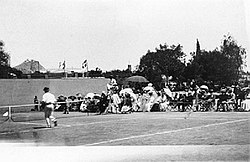Background
This was the first appearance of the men's singles tennis. The event has been held at every Summer Olympics where tennis has been on the program: from 1896 to 1924 and then from 1988 to the current program. Demonstration events were held in 1968 and 1984.
None of the leading players of the time, such as Wimbledon champion Harold Mahony, U.S champion Robert Wrenn, William Larned or Wilfred Baddeley, participated. [2] [3]
Under ancient Greek single-elimination tournament rules, there were no brackets as under modern single-elimination rules; instead, all participants in a round were paired off with one bye if a round had an odd number of participants left. This format could result in a semifinals round with only three competitors, as happened in both the 1896 wrestling and doubles tennis events, which started with five wrestlers/pairs: the first round had two matches, with one wrestler/pair having a bye, and the second round had only one match, with another wrestler/pair having a bye (a modern tournament would have had one match in the first round with three byes, leading to two semifinals).
The organizers avoided this problem in the singles tennis by dividing the players into four groups, with each group playing a single elimination tournament and the winner of each group advancing to the semifinals. [3]
No bronze medal match was held; both semifinal losers are now considered bronze medal winners (the current medal system was not used at the time).
This page is based on this
Wikipedia article Text is available under the
CC BY-SA 4.0 license; additional terms may apply.
Images, videos and audio are available under their respective licenses.
